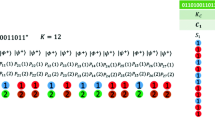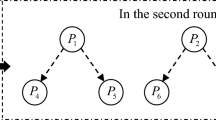Abstract
We propose a secure centralized multi-party quantum key distribution protocol based on four-particle GHZ state. Unlike centralized group session key generated by the third party, this paper uses an election algorithm to select initial participants, and the initial participants generate fairer centralized group session key, reducing dependence on the third party. Using the quantum resource GHZ state combined with unitary operations, a new encoding mode is used to quickly realize multi-party quantum key distribution, and the proposed protocol has lower time complexity. Theoretically, multi-particle GHZ state can be scaled for faster multi-party quantum key distribution. In addition, analysis and comparison show that the proposed protocol can resist common attacks and has feasible efficiency.


Similar content being viewed by others
Data Availability
The authors confirm that the data supporting the findings of this study are available within the article.
References
Diffie, W., Hellman, M.: New directions in cryptography[J]. IEEE Trans. Inf. Theory 22(6), 644–654 (1976)
Rivest, R.L., Shamir, A., Adleman, L.: A method for obtaining digital signatures and public-key cryptosystems[J]. Commun. ACM 21(2), 120–126 (1978)
Heisenberg, W.: Über den anschaulichen Inhalt der quantentheoretischen Kinematik und Mechanik[M]. Z. Phys. 43, 172–198 (1927)
Wootters, W.K., Zurek, W.H.: A single quantum cannot be cloned[J]. Nature 299(5886), 802–803 (1982)
Shor, P.W.: Algorithms for quantum computation: discrete logarithms and factoring[C]. Proceedings 35th Annual Symposium on Foundations of Computer Science. IEEE. 124–134 (1994)
Wang, J.-X., Liu, N., Wang, C., et al.: Multi-party Quantum Key Distribution Protocol Without Information Leakage[J]. Int. J. Theor. Phys. 58(8), 2654–3266 (2019)
Yang, C.-W., Hwang, T.: Fault tolerant quantum key distributions using entanglement swapping of GHZ states over collective-noise channels[J]. Quantum Inf. Process. 12(10), 3207–3222 (2013)
Wang, D.-J.: Research on multi-party quantum key distribution technology based on multi-particle entanglement[D]. Xi'an University of Electronic Science and Technology. (2015)
Wang, X.-B., Zong-Wen, Yu., Xiao-Long, Hu.: Twin-field quantum key distribution with large misalignment error[J]. Phys. Rev. A 98(6), 062323 (2018)
Liu, B., Gao, Z.-F., Xiao, Di., et al.: Quantum identity authentication in the orthogonal-state-encoding QKD system[J]. Quantum Inf. Process. 18(5), 137 (2019)
Ma, X.-Y., Wang, C.-N., Li, Z.-X., et al.: Multi-party quantum key distribution protocol with new bell states encoding mode [J]. Int. J. Theor. Phys. 60(4), 1328–1338 (2021)
Chen, J.-P., Zhang, C., Liu, Y., et al.: Sending-or-Not-Sending with Independent Lasers: Secure Twin-Field Quantum Key Distribution over 509 km[J]. Phys. Rev. Lett. 124(7), 070501 (2020)
Yin, J., Cao, Y., Li, Y.-H., et al.: Satellite based entanglement distribution over 1200 kilometers[J]. Science 356(6343), 1140–1144 (2017)
Liao, S.-K., Cai, W.-Q., Handsteiner, J., et al.: Satellite-Relayed Intercontinental Quantum Network[J]. Phys. Rev. Lett. 120(3), 030501 (2018)
Cao, Y., Li, Y.-H., Yang, K.-X., et al.: Long-Distance Free-Space Measurement-Device-Independent Quantum Key Distribution[J]. Phys. Rev. Lett. 125(26), 260503 (2020)
Xu-Dong, Wu., Zhou, L., Zhong, W., et al.: High-capacity measurement-device-independent quantum secure direct communication[J]. Quantum Inf. Process. 19(10), 354 (2020)
Yin-Ju, Lu.: A Novel Practical Quantum Secure Direct Communication Protocol[J]. Int. J. Theor. Phys. 60(3), 1159–1163 (2021)
Huang, Z.-M., Rong, Z.-B., Zou, X.-F., et al.: Semi-quantum secure direct communication in the curved spacetime[J]. Quantum Inf. Process. 20(11), 375 (2021)
Wang, P., Chen, X.-H., Sun, Z.-W.: Semi-quantum secure direct communication against collective-dephasing noise[J]. Quantum Inf. Process. 21(10), 352 (2022)
Yang, Y.-F., Duan, L.-Z., Qiu, T.-R., et al.: Controlled Quantum Secure Direct Communication with Authentication Based on Quantum Search Algorithm[J]. Int. J. Theor. Phys. 61(7), 184 (2022)
Yang, C.-W., Tsai, C.-W.: Efficient and secure dynamic quantum secret sharing protocol based on bell states [J]. Quantum Inf. Process. 19(5), 162 (2020)
Wang, T.-Y., Wang, X.-X., Cai, X.-Q., et al.: Analysis of efficient and secure dynamic quantum secret sharing protocol based on Bell states[J]. Quantum Inf. Process. 20(1), 7 (2021)
Jiang, S.-H., Liu, Z.-H., Lou, X., et al.: Efficient Verifiable Quantum Secret Sharing Schemes via Eight-Quantum-Entangled States[J]. Int. J. Theor. Phys. 60(5), 1757–1766 (2021)
Li, F.-L., Yan, J.-Y., Zhu, S.-X.: General quantum secret sharing scheme based on two qubits[J]. Quantum Inf. Process. 20(10), 328 (2021)
Zheng, T., Chang, Y., Zhang, S.-B.: Arbitrated quantum signature scheme with quantum teleportation by using two three-qubit GHZ states[J]. Quantum Inf. Process. 19(5), 163 (2020)
Verma, V.: Improved Quantum Teleportation of Ten-Qubit State Based on the Cluster State Quantum Channel[J]. Int. J. Theor. Phys. 60(1), 397–401 (2021)
Bennett, C.H., Brassard, G.: Quantum cryptography: Public key distribution and coin tossing[C]. Proceedings of the International Conference on Computers, Systems and Signal Processing. 175–179 (1984)
Li, Z.-H., SuhailZubairy, M., Al-Amri, M.: Quantum secure group communicationj. Sci Rep 8(1), 1–8 (2018)
Aluvalu, R., Chennam, K.K., Uma Maheswari V., et al.: A Novel and Secure Approach for Quantum Key Distribution in a Cloud Computing Environment[M]. Intelligent Computing and Networking. Springer, Singapore. 271–283 (2021)
Cabello, A.: Quantum key distribution in the Holevo limt [J]. Phys. Rev. Lett. 85(26), 5635–5638 (2000)
Acknowledgements
This work was supported by the Chongqing Municipal Education Commission Science and Technology Research Program Youth Projects (Grant No. KJQN202202401).
Author information
Authors and Affiliations
Contributions
Chao-nan Wang and Hong-feng Zhu contribute to the research idea; Chao-nan Wang have made significant contributions to the analysis and manuscript preparation; Chao-nan Wang conduct data analysis and write manuscripts; Hong-feng Zhu helped with the analysis through constructive discussions;
Corresponding author
Ethics declarations
Competing Interests
The authors declare no competing interests.
Conflict of Interest
The authors declared that they have no conflicts of interest to this work.
Additional information
Publisher's Note
Springer Nature remains neutral with regard to jurisdictional claims in published maps and institutional affiliations.
Rights and permissions
Springer Nature or its licensor (e.g. a society or other partner) holds exclusive rights to this article under a publishing agreement with the author(s) or other rightsholder(s); author self-archiving of the accepted manuscript version of this article is solely governed by the terms of such publishing agreement and applicable law.
About this article
Cite this article
Wang, C., Zhu, H. A Secure Centralized Multi-Party Quantum Key Distribution Protocol with New Encoding Mode. Int J Theor Phys 62, 128 (2023). https://doi.org/10.1007/s10773-023-05398-6
Received:
Accepted:
Published:
DOI: https://doi.org/10.1007/s10773-023-05398-6




